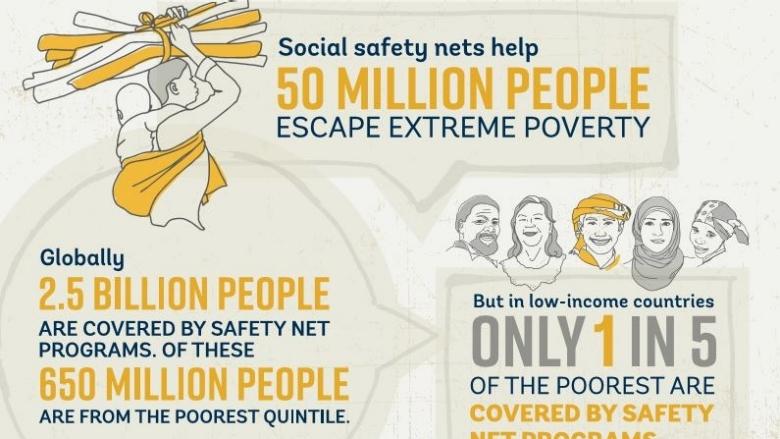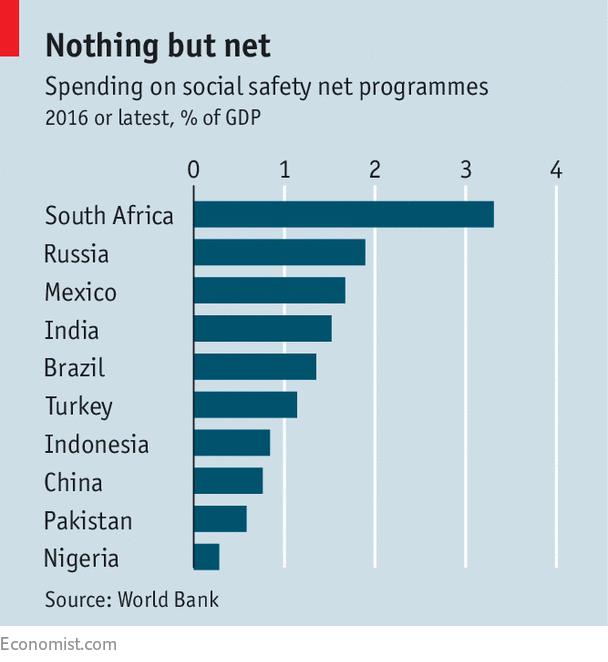Basicintroduction
Definition
Indevelopingcountriesandsocietiesundergoingsocialtransformation,thesocialsafetynetalsoreferstotheCompensatorytemporaryreliefprovidedbythemostdifficultgroupsofnegativeshocks.Fromthepointofviewofthebeneficiaries,itistherighttoobtainaminimumlivingguaranteefromthegovernment.Itsmaincontentincludesaseriesofstateinterventionmeasures,suchasthecreationofshort-termemploymentopportunitiesthroughinvestmentinpublicworksprojectsorotherefforts,andtheincometransferofdisadvantagedgroupsthroughpricesubsidiesforfoodorotherservicesandsocialassistance.
Protectthenetwork
Inadditiontobeingapolicytool,asocialsafetynetreferstoasocialprotectionnetworkthatpeoplecanrelyonwhentheyencounterdifficulties.Peopleliveinsocialnetworks.Whenencounteringeconomicdifficulties,differentpeopleseekhelpfromdifferentsources.Eachsocialgrouphasitsownuniquewaytodealwiththemostdifficultsituations.Beforethegovernmentprovidedhelptopeople,peopledependedextensivelyonthehelpprovidedbyfamilymembers,relatives,friends,communities,religiousornon-religiouscharitableorganizationsorcharitableactivitiesintimesofdifficulty.Thegovernment'shelpisactuallythelastthingtotell.Thisisthe"safetynet"thatactuallyexistsinsociety.Withoutit,thepressureonthegovernmentwouldbetoogreattobear.
Formingbackground
Protectivemeasures
Inthe1980s,theWorldBankproposedtwomajorstrategiesforpovertyalleviationindevelopingcountries:developmentoflabor-intensiveInordertocreatemoreemploymentopportunitiesandinvestmentinhumancapitalofthepoor,thatis,investmentineducationandhealthservices.ThissetofstrategiesisconsideredverysuccessfulinChinaandSoutheastAsia.TheWorldBankestimatesthat400millionpeopleinChinahaveescapedfromabsolutepovertyduetoeconomicdevelopment.SomeresearcherspointedoutthataccordingtotheWorldBank’s“onedollarperpersonperday”standard,urbanpovertyinChinahasdisappeared.However,insomeothercountriesintheworld,suchasLatinAmerica,Africa,andsomeformersocialistcountriesinEasternEurope,thepovertysituationhasnotbeenalleviated,andsomecountrieshaveevendeveloped.Forthisreason,theWorldBankadjusteditsstrategyandproposedfurtherprotectionmeasuresfordisadvantagedgroupswholacktheabilitytobenefitfromeconomicdevelopment.Therefore,intheearly1990s,theWorldBankproposedasafetynetstrategy,which,togetherwiththedevelopmentofalabor-intensiveexport-orientedeconomyandhumancapitalinvestmentinthepoor,constitutedtheWorldBank’sthreemainstrategiesagainstpoverty.


Quitecontroversial
Intheinternationalarena,thechoiceofsafetynetasanimportantwaytoreducepovertyisquitecontroversial.Thosewhoholddifferentopinionsbelievethatthisapproachfocusesonreliefratherthandevelopment,supportsshort-termconsumptionratherthanlong-termpovertyalleviation,andfocusesonsymptomsratherthancauses.
Thetit-for-tatcounterpointtotheviewsoftheWorldBankistheInternationalLabourOffice’splan.TheInternationalLabourOfficeistryingtocontinuetoadheretothesocialinsuranceschemelinkedtowageincomeinthecontextofglobalization.Emphasizethemaintenanceofstandardworkingconditions,andaddsocialclausestointernationaltradeclausestoprotectthelaborinterestsofdevelopedcountries.Developingcountriesarestronglyopposedtosocialprovisions.
Ascapitalflowsfreelyaroundtheworld,itispossibletoinvestinplaceswiththelowestlaborcost.InWesterncountries,duetohighwelfareandwages,laborcostsarehigh,andmanyworkerslosetheirjobs.Underthepressureofthelabormovement,thegovernmentsofWesterncountriesputpressureondevelopingcountries,inthenameofimprovingworkingconditions,askingdevelopingcountriestoincreasetheirlaborcosts.ThispolicyhasbeenusedbysomeWesterncountriesforprotectionistpurposesandhasbeenstronglyopposedbydevelopingcountries.Becauselow-costlaboristheonlyeconomicadvantageofdevelopingcountries.Theadoptionofhigh-securityandhigh-welfaresocialpolicieswillincreaselaborcostsandweakenthecompetitivenessofthesecountriesintheinternationalmarket.
Therefore,inthefieldofsocialpolicy,asocialpolicywithhighsecurityandhighwelfareisnotinthebestinterestsofadevelopingcountrylikeChina.Chinaneedssocialpoliciesthatcanusethelowesteconomiccosttoensuresocialstabilityandimprovethequalityofthepopulationtoensuretheinternationalcompetitivenessoftheeconomyintheprocessofglobalization.ThisisvitaltoChina'sfuture.
China'ssocialsafetynet
Fourcharacteristics
①Adheretotheoverallplanningofurbanandruralareas,acceleratetheconstructionoftheruralsocialsecuritysystem,andpromotethedevelopmentofChina'sindustrializationandurbanization.
②Insistonregionaloverallplanning,people-oriented,andestablishamulti-levelsocialsecuritysystemtomeetmulti-levelneeds.
③Adheretothegovernmentasthemainstay,expandthemarket,andcitizenstoparticipateintheconstructionofsocialsafetynets,thatis,adheretothecombinationoffairnessandefficiency,andavoidsituationswherethelevelofsocialsecurityistoohigh,thecoverageistoowide,andtheburdenofnationalpowerisexceeded.China'ssocialsafetynetshouldbeorientedtowardsthe"BasicGeneralizedSystemofPreferences."Whileconsideringexpandingcoverage,italsoemphasizestheroleofsocialsafetynetsinstimulatingcitizens'employmentandpromotingeconomicgrowth.
④InthereformofChina'ssocialmanagementsystem,thesocialsafetynetmechanismisanimportantpart.Intheprocessofstrengtheningsociallegislation,weshouldcontinuouslyimproveandperfectsocialsecurityrelatedlawsandregulations,andraisethelevelofsocialsecuritylegislation.
Goalselection
InChina,duetothelimitationofeconomicstrength,itisnotpracticaltochooseincomesecurityasthemainsocialpolicygoal.Atthesametime,thegovernmentcannotgiveupitsresponsibilitytoprovideassistancetothemostdifficultsocialgroups.Therefore,aneconomicallyfeasiblepolicyoptionmaybe:theChinesegovernmentchoosesasafetynetstrategy,fullyassumestheresponsibilityofprovidingassistanceandservicestothemostdifficultsocialgroups,andtakingintoaccountthepolicygoalsofincomesecurityandsocialequity,sothatSelf-reliantsocialgroupsareself-relianttothemaximum,soastoachievesocialwelfareandsocialsecuritypoliciesthatusethelowesteconomiccosttoensuresocialstabilityandensuretherealizationofthecentralgoalofeconomicdevelopment.
AdministrativeManagement
Therefore,choosingasafetynetpolicyforsocialassistancedoesnotautomaticallyguaranteethattheabovepolicychoicescanberealized.Althoughintheory,thesafetynetpolicyofsocialassistancecanaccuratelytargetpoorgroupsthroughhouseholdmeanssurveys.However,ithasalsofailedtousesocialinsurance'smechanismtorestrictexpenditurebasedonpaymentconditions.Inpractice,duetothehighcostoffamilymeanssurveys,ifmoralconstraintsandotherrestrictivefactorsarenotstrong,providingcashassistancewithoutadditionalconditions(exceptforthefamilymeanssurveyconditions)topeoplewhohavetheabilitytoworkislikelytobeanotheroption.Abottomlesspitofurbanwelfarerequiresspecialattentioninasocietytransitioningfromasocialistplannedeconomytoamarketeconomy.AfterstudyingthesocialpoliciesofthesocialistcountriesoftheformerSovietUnionandEasternEuropeduringtheeconomictransitionperiod,someresearchersputforwardthreetechnicalconditionsforestablishingasocialassistancesafetynetforhouseholdmeanssurveys:First,understandingandcomparisonofincomelevelsItiseasy.Whenthereisalargeamountofinformaleconomyandhiddenemployment,orwhenemployersarewillingtoassistemployeestodeceivethestateinordertodefraudthebenefits,thesocialassistancemethodofhouseholdmeansinvestigationwillfail.Second,nationalorregionalgovernmentagencieshavethenecessaryadministrativecapabilitiestomanagethesafetynetofhouseholdbudgetinvestigations.Third,thegovernmenthasthefinancialabilitytoprovidethegapbetweenthepovertylineandactualincome.Iftheseconditionsarenotmet,theimplementationofsocialassistanceforhouseholdmeanssurveysmaynotachievethegoalsofthesystemdesign.ConsideringthesimilaritiesinsocialphenomenabetweenChinaandthesetransitionaleconomies,China’ssafetynetpolicyofsocialassistancebasedonhouseholdmeanssurveysneedstobeespeciallycautious.
Help
Actually,Chinausessocialassistancetohelpthemostdifficultsocialgroups,andatthesametimesuccessfullypreventsthecountryandthecommunity’sexperienceintheabuseofassistanceresources.China’ssecuritysystemforthe“threenos”andthe“fiveguarantees”householdsinruralareasisaninstitutionalizedreliefforthemostdifficultsocialgroups.Thespiritofmutualassistancecultivatedbythethreenosandthefiveguaranteessystem,theculturaltraditionsthatopposedependence,andCadreswhoaresympathetictothemostdifficultgroupsareimportantresourcesforthedevelopmentofarealsafetynetinChina.However,aftertheestablishmentoftheminimumlivingguaranteesystem,themethodofsocialassistanceinChinaisundergoinganimportantinstitutionalchange:thatis,providingassistancebasedonthesocialtypeoftherecipient,toprovidingassistancebasedontheeconomicstatusoftherecipient..Thisprincipledchangeraisesthequestionofhowtoevaluatethepasttype-basedaidprinciplesandaidsystems.Italsoraisesveryspecificquestionsabouttheeconomicfeasibility,politicalfeasibility,andmanagementfeasibilityofthenewmethod.Howtopreventmoralobstaclesandfraud.Theimpactofthischangeinprincipleonfiscalexpendituresandthelong-termmoralandculturalimpactontheChinesenationalsoneedtobegivenfullattention.
